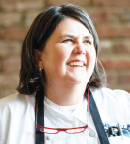The battle against cancer is typically waged by the surgeon and oncologist, but a Lexington, Kentucky–based, award-winning restaurateur and chef discovered her role as a foot soldier when she applied her culinary skills to deal with the debilitating side effects of her mother’s lung cancer treatments.

Chef Ouita Michel
Chef Ouita Michel tapped into the science of neurogastronomy—the study of flavor perception—to help her mother navigate the 11 months from diagnosis to death. “Our mission was to mitigate as much as possible the discomfort and anxiety about food as my mom’s disease progressed,” Ms. Michel said.
All-natural foods had always been at the forefront of her mother’s culinary style. “Not exactly a hippie, but leaning toward countercultural” is how Ms. Michel describes her mother, Pam Sexton, and her approach to raising three children in the mid-1970s. On the menu: home-made yogurt, fresh daily baked bread for school lunches, and textured soy protein instead of ground beef. Occasional treats to celebrate holidays were adapted to her high health-food standards: Christmas cookies made with real butter vs vegetable oil shortening and Easter baskets filled with carob chocolate.
Our mission was to mitigate as much as possible the discomfort and anxiety about food as my mom’s disease progressed.— Ouita Michel
Tweet this quote
“She never used processed food,” Ms. Michel said. “She was an artisanal cook; what fresh fruit and vegetables we didn’t eat, she canned and froze.” That’s the background Ms. Michel brought to bear as she tackled her mother’s challenged palate, beaten down by chemotherapy, which may infuse a metallic element into taste buds and destroy flavor.
“I learned a sense of cooking through my mom but didn’t realize the magnitude of that until we were fighting for her life,” recalled Michel, co-owner with her husband of 8 restaurants within a 20-mile radius of Lexington, Kentucky. She is a renowned Bluegrass chef and six-time James Beard Foundation Award nominee as Outstanding Restaurateur and Best Chef Southeast.
Neurogastronomy Symposium
Among more than a dozen speakers from the ranks of culinary professionals, agriculture professionals, and scientists of gastronomy as it relates to the brain and behavior, Ms. Michel was a featured speaker at the 2019 International Society of Neurogastronomy (ISN) symposium in New Orleans, which attracted physicians, oncologists, nutritionists, pharmacists—and chefs—from across the United States.
“The concept of neurogastronomy casts a wide net over all disciplines that are relevant to what we eat, why we like what we eat, and how we eat,” according to the mission statement of the ISN organizers. The symposium aims to advance neurogastronomy as a craft, science, and health profession.
“We struggled to keep not only the physical stability, but also the emotional balance. Patients understand the importance of eating in order to be strong enough to endure the next treatment. But chemotherapy knocks out the bad cells and the good ones, too—drastically inhibiting taste and depressing appetites,” Ms. Michel said.

Dan Han, PsyD
“By focusing a lens on how flavor is experienced in the brain, clinicians seek to optimize food as preventive medicine and as an intervention for disease and disease-related difficulties in quality of life,” said ISN cofounder Dr. Dan Han, Chief of the University of Kentucky Neuropsychology Service. “These are important aspects of clinical management, quality of life, and precision care for the individual.”
Waning Appetite
Although scans every 6 weeks were an integral part of her mother’s treatment regimen, Ms. Michel felt increasing pressure to treat her waning appetite as it bottomed out with the accumulating discomfort and anxiety related to food. She appreciated that the oncologist was focused on treating the disease, but she realized the family had to rally to “treat not just the illness, but the patient herself.”
“The oncologist relied on traditional medical assessment tools and made all the usual inquiries monitoring her activities,” Ms. Michel recounted to the audience of health-care professionals. “But not much attention was paid to nutrition and how nutrition can impact that assessment.”
Eventually, even the scent of food could be a disincentive to eat, so Ms. Michel lessened the impact by placing meals on the kitchen counter to dissipate the smell throughout the house and not overwhelm her mother. As the treatment began to dramatically reduce her mother’s sense of taste—and her appetite—Ms. Michel had to get more creative in finding ways to make meals—or anything—appetizing.
“Initially she did fine eating whole grains and dark leafy greens like Swiss chard and spinach,” Ms. -Michel said. But as the chemotherapy continued, they became unpalatable. She could no longer abide the taste or smell of kale, one of her favorite vegetables.
NEUROGASTRONOMY
The term neurogastronomy was coined by Gordon Shepherd, MD, DPhil, in an article in Nature (444:316-321, 2006). He used it to describe a discipline built on the biochemistry of food preparation, the molecular biology of the olfactory receptors, and the knowledge of odor images and the brain flavor system.
Ms. Michel defaulted to bland, creamy, and sweet flavors. She relied on clear chicken broth and frozen fruit smoothies. Ever the restaurateur and neurogastronomist-practictioner, Ms. Michel concentrated on making the contents on the plate—as simple as poached chicken or a piece of toast—as attractive as possible. “I’d plate the food to provide a sense of comfort,” she said. A boneless bland chicken breast would appear to be a five-star meal when Ms. -Michel sliced it into thin slivers and fanned them out on the plate, garnished with a sprig of parsley.
Ms. Michel tended to the context of the meal with visual strategies to tease the appetite, too. “I’d bring a tray to her bedside with a bud vase and linens,” she said.
International Society
The ISN and its accompanying symposium were founded in 2015 by Dr. Han. He and his colleagues were inspired by the clinical impact that such a program could have on prognosis in a range of diseases and medical conditions, including Parkinson’s disease, Alzheimer’s disease, stroke, cancer, and traumatic brain injury.
“Smell and taste, quality of life, enjoying food, and nutritional intake based on your enjoyment of food all change after diagnosis, but nobody asks, ‘What do we really do about it? How do we address it? What’s next?’” Dr. Han asked rhetorically. Brainstorming with a team of noted chefs and restaurateurs, the ISN founders realized that bringing together chefs, neuroscientists, and food scientists to explore ways to help patients enjoy food could be a significant contribution to science and to life.
“The flawed assumption is that the person, disease, one’s psychology, and nutrition are all separate issues. Systems-wise, it’s all about the person,” Dr. Han said. As Ms. Michel’s mother’s disease advanced, her anxiety regarding food, taste, and caloric counts affected her cancer treatment. “We see this too often in clinical management,”
he said.
Addressing flavor—what neurogastronomy considers a focal point of the domino effects of sickness—is a crucial tactic, Dr. Han said. “When necessary good food tastes bad, there is no compliance for sufficient nutritional intake.”
Role of the Chef
Initially, Ms. Michel’s interest in neurogastronomy was fueled by her mother’s medical condition, to provide an alternative way of looking at food for a chronically ill person. But now, that mission has taken on a broader scope.
“Neurogastronomy can change lives. It helped me understand how to be a caregiver,” said Ms. Michel, who taught, in conjunction with a nutritionist, a cooking class for patients and integrative medicine at the University of Kentucky’s Markey Cancer Center. One of the signature recipes is a chia seed and coconut milk pudding, because of its creamy texture and nutritional density.
When she was first approached to tell her story to an audience of health-care professionals, Ms. Michel admits that she didn’t know what value she could add to the discussion. But Dr. Han convinced her that her role as a chef is to express what she knows as a professional and bridge the gap to the clinical sphere. “He says that what we [chefs] can do is a gift to the medical community,” Ms. Michel said. ■
DISCLOSURE: Ms. Michel reported no conflicts of interest. Dr. Han has received funding from Brown-Forman, UK College of Medicine, UK HealthCare, UK College of Agriculture - The Food Connection, and National Institutes of Health/National Institute on Deafness and Other Communication Disorders.

